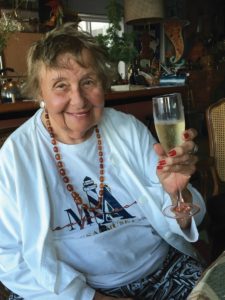PROVINCETOWN — Barbara Rushmore, a fixture of civic life here for 60 years, died at age 98 at her home in Provincetown on Nov. 18, 2022. But the positive changes she fought for, from town hall to the Waterfront Memorial Park, live on.

From the 1960s onward, Rushmore’s tenacity brought dozens of articles to town meetings and hundreds of trees to Provincetown. As recently as June 2017, one article she championed via citizens’ petition caused an entire special town meeting. She proposed that the town buy the privately owned parking lot on Bradford and Conwell streets for town parking and as a site for a new police station. It failed, and everyone went home in one hour.
Her life was not easy. She endured a childhood bout of polio, two divorces, and the deaths of a daughter, a stepdaughter, and a grandchild. But Rushmore’s optimism never faltered, said her grandson Erik Yingling, who was inspired by his grandmother’s civic contributions to run for selectman at age 30.
“She taught me to not be afraid of that kind of conflict, and she was good at not holding grudges,” he said. “You had to be ready to fail a little bit but to keep plowing ahead, because you often don’t succeed the first time.”
“Barbara was always active in civil rights, even before Provincetown,” said her daughter Katherine Shields. “I cannot even begin to tell you the causes she championed.”
She was born Barbara Lou Brodsky in Newark, N.J. Her father, Nathan, was a lawyer and stockbroker who suffered tremendous losses in the Great Depression, according to Peter Macara, Barbara’s partner of 46 years. Her mother, Laura, used her ingenuity and knowledge of fashion to make ends meet by selling women’s clothing out of their home. Her seven aunts were early influences in her life, as was her grandfather, Rabbi Hyman Brodsky. He was known as a compassionate and open-minded man, said Macara, and he instilled those values in Barbara and her younger sister Naomi Ruth, known as Mimi. Rabbi Brodsky was famous for establishing an interest-free small-loan program to help Jewish immigrants get a start in this country.
When Barbara was seven or eight, she contracted polio, Macara wrote in a tribute to her. She spent five years in treatment at the Warm Springs Foundation in Georgia, where she got to know Franklin and Eleanor Roosevelt, who came to Warm Springs for the president’s health. As first lady, Eleanor Roosevelt was the honorary head of the Girl Scouts. Seeing how the young girl patients were lacking stimulation and schooling at Warm Springs, Roosevelt made them all Girl Scouts and got them proper handbooks and uniforms. They became Girl Scout Troop No. 1.
Although Barbara missed five years of school, she went on to attend college at Ohio State and received her master’s degree in chemistry from Emory University in Atlanta.
One of her early jobs was working for the Mars family as the chief chocolate tester for M&Ms. After an ill-fated marriage to Fred Gottlieb, Barbara married Will Rossmoore, a civil rights attorney and World War II pilot. They lived in Montclair, N.J., raised four daughters, and came to Provincetown in the summer.
Though Barbara and Will both held progressive political views, Barbara’s style was too outspoken for Will’s taste, Yingling said. When they were attending Will’s Columbia Law School class reunion, Will introduced Barbara to Roy Cohn, Sen. Joe McCarthy’s chief counsel during the Red Scare of the 1950s and a prosecutor who helped put suspected spies Ethel and Julius Rosenberg in the electric chair. Rather than shake Cohn’s hand, Barbara said loudly, “I wouldn’t touch you with a 10-foot pole,” Macara wrote.
“My grandfather was so mad, he left her in New York and she had to find a ride home,” Yingling said.
After divorcing Rossmoore, Barbara moved to Provincetown in the 1960s. She changed her name to Rushmore — so that if she “did anything wonderful, it wouldn’t reflect well” on her ex-husband, she told Eric Borg of the Provincetown Banner in 2014. She met Macara in 1976 at Piggy’s, Yingling said.
Barbara’s local activism began when one of her daughters was applying for a job at a waffle house on Lopes Square. In the early 1970s, it was the custom for “out of town” workers to be fingerprinted, Rushmore told Borg. She persuaded town meeting voters to ban the practice. She was rarely silent at town meetings after that.
“I moved back in 1972 and saw her at a town meeting, and I said, ‘I want to be just like her,’ ” said Town Moderator Mary-Jo Avellar.
One of Avellar’s favorite memories is of Rushmore tying herself to a beloved tree at the corner of Bradford and Standish streets to prevent it from being cut down. She drove Town Manager Jim Jeffers and Police Chief James Meads crazy in the 1980s, Avellar added.
For years, Rushmore would rise at town meeting to object to the temporary undercover officers used in drug busts when Meads was chief, Avellar said. Opposition to what she called “rent-a-narc” was one of her many perennial causes. She also fought successfully to get rid of Provincetown’s pay toilets on the grounds that they discriminated against women, since men could pee anywhere, her daughter Katherine said. That effort became known as the “free to pee” campaign.
“In my opinion, the town comfort station should be named for Barbara Rushmore,” said Chris Snow, a longtime resident. “She was an icon at town meeting.”
Her legacy includes inspiring two grandsons, Yingling and Raphael Richter, to serve on the select board.
Rushmore had an ongoing “Trees for Town” campaign that included placing antique milk jugs around town to collect donations to buy and maintain memorial trees. Known as “the tree lady,” she was responsible for planting over 400 trees, developing various public parks, and placing many memorial benches over the years, working with the Provincetown DPW and volunteers, Macara said.
A bench in front of town hall bears her name in recognition of her good works, and she was named Senior Citizen of the Year in 2016. Three cherry trees, since moved to Julia Perry’s yard when they were displaced by construction at 350 Bradford St., were planted in memory of Rushmore’s daughter, Emily Rossmoore, who died of AIDS in 1995. Emily’s own daughter, Jacqueline Stavis, who was raised by Rushmore and Macara until she was adopted at age three, was killed by lightning at a New Orleans music festival in 2016 at age 28.
“Barbara always said to me, ‘Don’t focus on the sad parts of life; focus on the happy parts,’ ” Katherine said. “She was able to compartmentalize things in a remarkable way.”
She is survived by her partner, Peter Macara of Provincetown; daughters Laura Rossmoore of Tampa, Fla. and Katherine Shields of Marshfield; grandchildren Erik Yingling of Provincetown, Raphael Richter of Truro, Elise Boyce of Sandpoint, Idaho, and Justin and Tyler Shields; and two great-grandchildren, Mica William and Harper Rose Richter of Truro. She was predeceased by her daughter Emily Rossmore, her stepdaughter Susie Stone, and her granddaughter Jacqueline Stavis.
The family is planning a graveside service for Rushmore’s closest kin at 10 a.m. on Saturday, Dec. 10 to be followed by a public remembrance at Provincetown Town Hall at 11 a.m.



